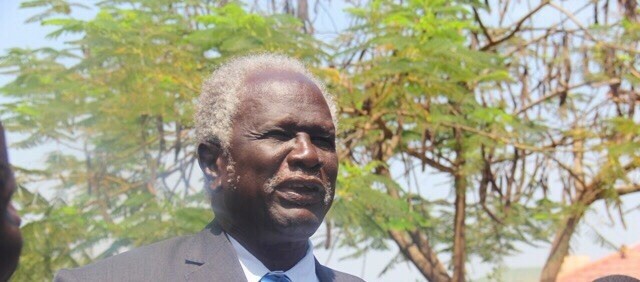A fresh controversy has emerged at the National Elections Commission (NEC) following orders by its Chairperson to remove Secretary General Yohannes Amum Nyiker and appoint members for high committees at the state level, according to leaked documents reviewed by Radio Tamazuj.
In a letter dated 24 June addressed to NEC Chairperson Prof. Abednego Akok Kachuol and copied to President Salva Kiir, First Vice President Riek Machar, and the vice presidents, the Commission’s Deputy Chairperson, Gabriel Gabriel Deng, said his boss’s decisions were not in conformity with the legal and regulatory framework governing the Commission.
“The order made by the Chairperson relieving Secretary General Yohannes Amum Nyiker was unilateral and unprocedural. And the names publicly announced by the Chairperson for the high committees at the state level deviates from the rosters approved by the NEC for appointment,” one of the documents read in part.
On 29 May, the NEC Chairperson fired his Secretary General, and on 17 June, he announced the establishment of high committees in the 10 states, each consisting of a chairperson, deputy chairperson, and three committee members.
According to the letter written by the Deputy Chairperson, the Chairperson’s decision to remove the Secretary-General needed to have identified the cause enumerated in the National Elections Act, 2012 (Amendment) Act, 2023.
“Specifically, this is not in keeping with NEA Section 23(5) (providing that the SG may be removed by the Commission for cause) together with NEC Internal Rules and Regulations, 2013 (NEC Rules) Section I. 4(1) (providing that decision- making of the Commission shall be made by a majority vote of members present). Furthermore, as decided in the meeting on 7 June 2024, the Commission resolved that the Chairperson would be given a week to respond to the concerns raised by Commission members regarding the nature of the SG’s termination. As of writing, this period has lapsed, and the NEC has not received any such communication from the Chairperson,” the letter read in part.
He added that the members of the high committees announced by the Chairperson contradict the rosters approved for appointment by the NEC in its meeting on 14 June 2024.
“This is in violation of NEA Section 26(1) (providing that the high committees at the state level shall be formed and appointed by the Commission). Furthermore, NEA Section 26(2) provides that each high committee shall be comprised of five members, including a state returning officer. However, during the Commission’s deliberations on the formation of high committees, the Chairperson directed that the appointment of state returning officers should be decided at a later date as additional sixth members, contrary to NEA Section 26(2),” he said.
The Deputy Chairperson, who represents the opposition, demanded that the order relieving the NEC’s Secretary General be rescinded and that the state-level high committees be sworn in according to the names approved by the Commission, with the designation of state returning officers among them.
In another letter dated 2 July addressed to Jemma Nunu Kumba, the Speaker of the Transitional Legislative Assembly, Gabriel Deng urged Parliament to take appropriate action to resolve the dispute in the Commission.
“Rt. Hon. Speaker, the gravity of the NEC’s work for building a stable democracy cannot be overstated. A poorly administered electoral process can be a source of instability, diminish trust in our public institutions, and ultimately weaken South Sudan’s democracy,” he concluded.
Prof. Abednego Akok, the NEC Chairperson, could not be reached for comment.
South Sudan’s National Election Commission (NEC) has announced 22 December 2024 as the election date as per Section 16 (1) of the National Election Act 2023.
The NEC chairperson told the press on Friday that delays by the parties to the 2018 peace deal to agree on the elections have deferred the voter registration exercise, which was supposed to have started in June.
Despite the plans unveiled by the National Elections Commission, the feasibility of South Sudan’s December 2024 elections — the first since the country gained independence in July 2011 — is increasingly in doubt.




